#or at least it was in that algorithmic sphere
Explore tagged Tumblr posts
Text
i think that lesbian webseries i watched when i was like 15 about a lesbian who had a very drunken one night stand with some frat boy himbo and accidentally got pregnant from it became too much of a blueprint for how i play with fictional character dolls
#txt#i don't think i necessarily shipped those two characters but i do have so many ships where im like.#these characters would be better off as lesbian and gay but then each other happened and im not responsible for#anything that follows despite me being the one imagining scenarios for them#oblig ofc bisexuality exists. this is not about that. i mean it could be. but it kind of isn't.#anyway if anyone knows what fucking webseries this was please link it i have no idea how to find it again#i think the channel also had some short film about a lesbian going off to college breaking up with her bf bc she kissed her bestie ????#or at least it was in that algorithmic sphere#it has been like 10 years#FOUNDD IT ITS CALLED INCONCIEVABLE
2 notes
·
View notes
Text
might stick a section on basic catenary/pantograph physics in my electrification post because while it’s a VERY niche in the weeds thing… it’s pretty mimeable even with the “catenary wires are invisible but pretend they’re there” convention of many model trains. Pantograph arms are human arm-shaped enough to mimic raising/lowering, with one or two arms depending on what type the train has. “Hang loose” or sign of the horns works well for the for “horned” pantographs, flat hand for older flatter styles. Straight arm with rotating wrist for trolley pole swinging in/out of position.
(third rail just means lights on the skates somewhere. Static buildup from them is a thing anyways)
#it’s a very niche but VERY well documented topic#like most things rail electrification#it’s almost incurably nerdy and unsexy but SO WELL DOCUMENTED#(Which is heaven as someone from the coaster enthusiast sphere where info is way more scarce)#i’ve seen someone say “yeah you can find more info on most military fighter jets than coasters”#it’s just so weird the more i see how this topic is so obscure among the public but has SUCH good sources#it’s just not something the algorithm will feed you and you have to seek it out (and be at least somewhat familiar with physics)
1 note
·
View note
Text
It took about two hours for Daina Taimina to find the solution that had eluded mathematicians for over a century. It was 1997, and the Latvian mathematician was participating in a geometry workshop at Cornell University. David Henderson, the professor leading the workshop, was modelling a hyperbolic plane constructed out of thin, circular strips of paper taped together. 'It was disgusting,' laughed Taimina in an interview.
A hyperbolic plane is 'the geometric opposite' of a sphere, explains Henderson in an interview with arts and culture magazine Cabinet. 'On a sphere, the surface curves in on itself and is closed. A hyperbolic plane is a surface in which the space curves away from itself at every point.' It exists in nature in ruffled lettuce leaves, in coral leaf, in sea slugs, in cancer cells. Hyperbolic geometry is used by statisticians when they work with multidimensional data, by Pixar animators when they want to simulate realistic cloth, by auto-industry engineers to design aerodynamic cars, by acoustic engineers to design concert halls. It's the foundation of the theory of relativity, and thus the closest thing we have to an understanding of the shape of the universe. In short, hyperbolic space is a pretty big deal.
But for thousands of years, hyperbolic space didn't exist. At least it didn't according to mathematicians, who believed that there were only two types of space: Euclidean, or flat space, like a table, and spherical space, like a ball. In the nineteenth century, hyperbolic space was discovered - but only in principle. And although mathematicians tried for over a century to find a way to successfully represent this space physically, no one managed it - until Taimina attended that workshop at Cornell. Because as well as being a professor of mathematics, Taimina also liked to crochet.
Taimina learnt to crochet as a schoolgirl. Growing up in Latvia, part of the former Soviet Union, 'you fix your own car, you fix your own faucet - anything', she explains. 'When I was growing up, knitting or any other handiwork meant you could make a dress or a sweater different from everybody else's.' But while she had always seen patterns and algorithms in knitting and crochet, Taimina had never connected this traditional, domestic, feminine skill with her professional work in maths. Until that workshop in 1997. When she saw the battered paper approximation Henderson was using to explain hyperbolic space, she realised: I can make this out of crochet.
And so that's what she did. She spent her summer 'crocheting a classroom set of hyperbolic forms' by the swimming pool. 'People walked by, and they asked me, "What are you doing?" And I answered, "Oh, I'm crocheting the hyperbolic plane."' She has now created hundreds of models and explains that in the process of making them 'you get a very concrete sense of the space expanding exponentially. The first rows take no time but the later rows can take literally hours, they have so many stitches. You get a visceral sense of what "hyperbolic" really means.' Just looking at her models did the same for others: in an interview with the New York Times Taimina recalled a professor who had taught hyperbolic space for years seeing one and saying, 'Oh, so that's how they look.' Now her creations are the standard model for explaining hyperbolic space.
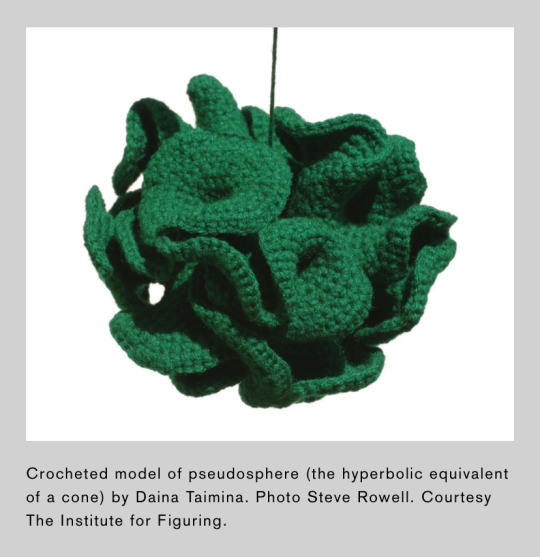
-Caroline Criado Perez, Invisible Women
Photo credit
#caroline criado perez#Daina Taimina#women in stem#women’s history#women in science#crochet#crocheting#female mathematicians#hyperbolic space
385 notes
·
View notes
Text
From a comment on a video I lost the link to:
Giving a perspective outside the YouTube commentary sphere, the conclusion you come to at the end is the same thing I've learned over and over again while making art (sort of) in another sphere, mostly digital illustration, music and the furry fandom (yeah I'm one of Those Ones)
Sometimes when i upload things on the internet it really does feel like I'm just feeding things to the Algorithm© to widen my own reach, but really when you're in such a specific niche in such a specific community it's impossible to get that sort of widespread appeal websites like Instagram, Bluesky, and especially YouTube are designed to foster and feed from.
That kind of drive for success isn't only about money sometimes, it's also about popularity. That's obvious, but what's not so clear is what popularity represents. When the Numbers Go Up it can feel like a quantization of your own social importance, like "oh yeah I've made it big now". And every single thing I've done in the past to generate that kind of popularity hasn't really worked and has just left me burned out.
From the viewers' perspective i guess the "solution" is just to be more discerning about the art and content we consume by looking out for more good art and god content to actually enjoy. But as "artists"? What really is the solution?
It's kind of impossible to stop wanting to be popular and well liked. But the thing that's come the closest to working for me has been to keep that desire for popularity in check, before it consumes you and disappoints you. Because when people pander, it doesn't work like 99% of the time. Early viewers can tell you're being disingenuous and just pandering to what's popular, and the late viewers won't come unless the Algorithm© randomly recommends your stuff.
I'm mostly writing this as a warning to myself: don't pander that much! Sometimes what really matters is quantity, not quality. Just do as much experimentation and weird shit that you feel personally motivated and artistically driven to create, and eventually one of those will get at least 1k views.
You probably won't become the next best artist. But that's okay. You had fun making it.
8 notes
·
View notes
Text
thermodynamics and our insanity.

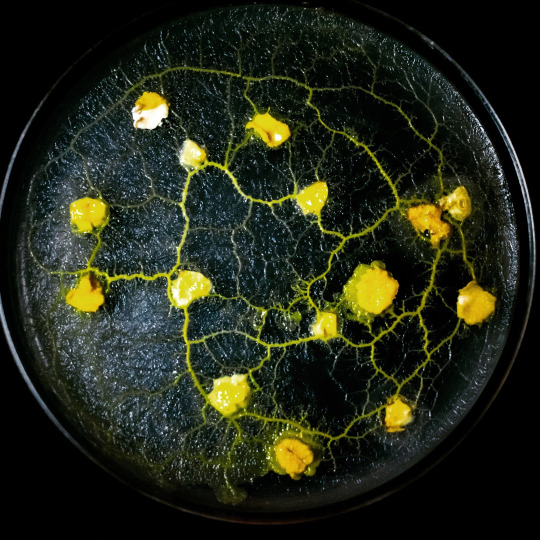
A* (A-Star) Pathfinding Algorithm
i think that everything in the universe is taking the path of least resistance. well, not really- i don't believe that our consciousness is the sole product of our minds i think we're more than this. i think people have souls, they can be kind towards strangers even though for a fact in some cases we know that we're not getting any benefit back out of it. it might even cost us yet we still choose to help others.
i think our actions are highly deterministic, but not fully. we can go with the flow of life or we can be bothered about something and make a change. make a choice that doesn't make sense, put more effort than what's it worth.
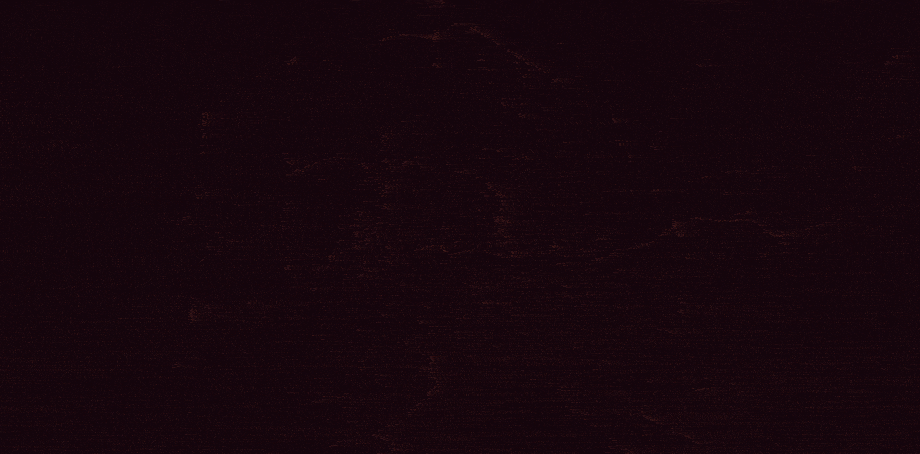




even our computer algorithms are just slaves to thermodynamics, we frown upon using programs that "lag" or are slow, we find faster alternatives or we abandon the program altogether. we try to organize concepts and thoughts as efficient algorithms that run on these processors. even the processors themselves, when they get faster, they're not really "getting faster"- they're just using the same amount of electricity more efficiently.
in essence, everything is converging towards the least amount of effort, the shortest path.
human societies also converge towards the path of least resistance, in the form of: road networks, social networks, internet routing hubs, government procedures, data collection and privacy, ads, fuel economy, google search,,, etc.
we do things that are useless in terms of reproduction and thermodynamics. if we're strictly machines whose purpose is to reproduce and slow down entropy as much as possible, then most of what we do doesn't make sense and violates this assumption.
i think we're more than that. i think we can accelerate entropy and give a big middle finger to thermodynamics, a big fuck you to the laws of physics despite being completely slaves to them.
please slow down and try to open up the images and gifs and admire them one by one. some images contain "alt" description which can be viewed by hovering a mouse over the images on a computer. what's the hurry for?


i think nature is lazy and it's just following the same recipe whenever it can. it feels fractal, it's always converging to the same boring and eloquent solution. it's obsessed with the least resistance path.

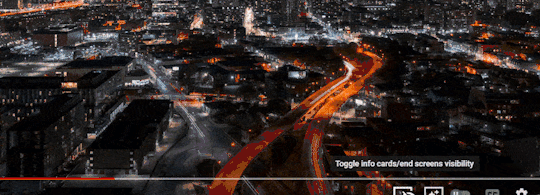



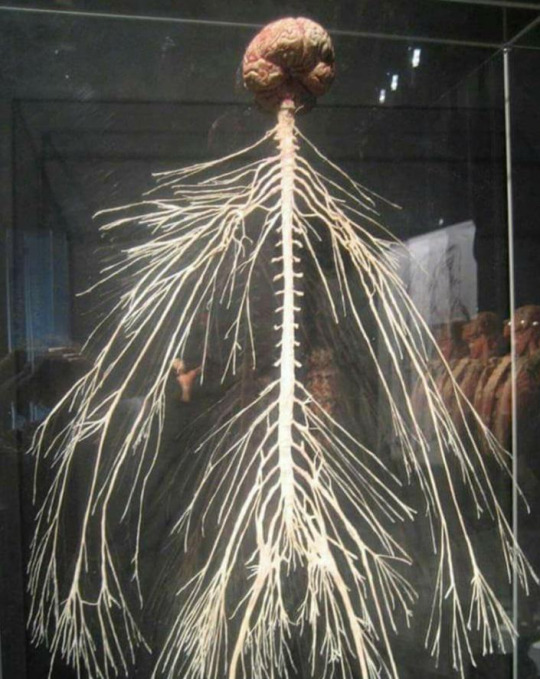



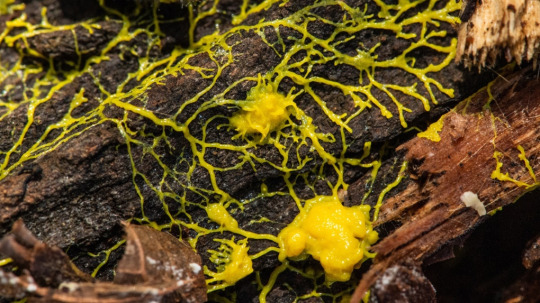
what about food, and over consumption? how people choose cheap sugar filled food and drinks? social relationships? the steps you take in order to be attractive to others? the amount of exploration you need in order to pick a movie to watch? war? the forming of stars? the shape of planets? the separation in their orbits? daily traffic? the taste of ice cream? what makes you laugh at a joke? the shape of cities? language?
all these concepts are in their own fucking universes and have their "whatever-the-fuck-x-dimension" problem space.
and all these pretty patterns that we just saw are only patterns we could recognize. but our minds are too simple to recognize patterns that hide in high dimensional spaces. but they're still there, they're probably even prettier, it's lost beauty that we cannot see or even think of.
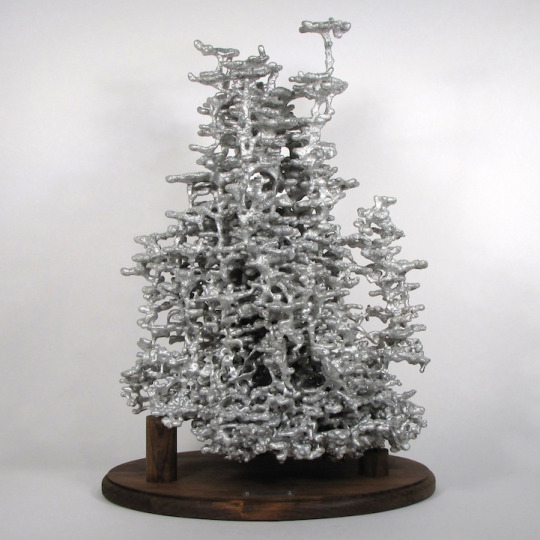
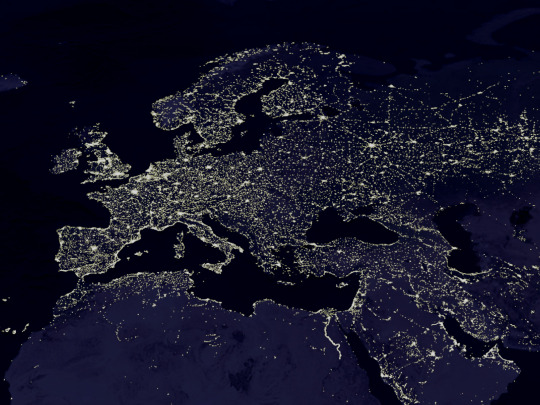
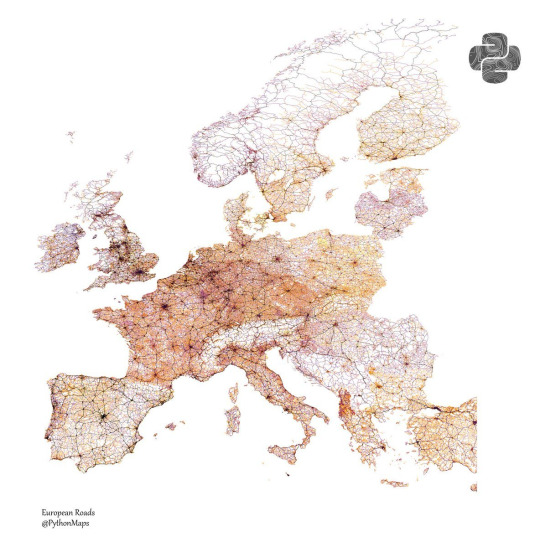
all these patterns that we're recognizing are there only because our brains are optimized to recognize things in 3d space. ok... what about higher dimensional spaces? 4? 6? 1337 dimensions? i'm not talking spacetime dimensions, i'm talking about all concepts, prices, star formation, molecular chemistry, fuel prices, the rate of foreign words infiltrating a language. they're all still canvases for "shortest pathways" to emerge, even if it doesn't look straight to your naked eye, in a higher dimension they're the shortest path.

let me demonstrate an example, suppose you wanna travel from the U.S. to Spain, the shortest path would be a line right?

well it depends, where is this line? in what dimension? can the line be "curved"? are there any obstacles on the way?
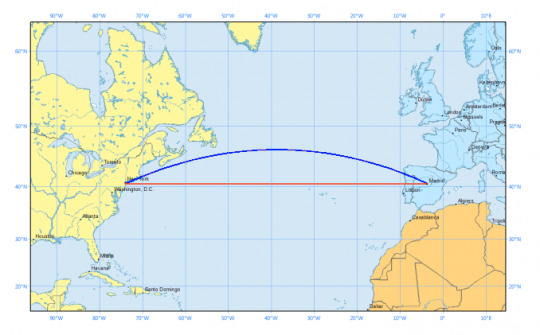

in this case, you warped and deformed a 3-dimensional sphere surface onto a 2d rectangle, do you really think you're going to maintain information without deformation? absolutely not, and that's why on the rectangular map view on the left, the shortest path isn't the red straight line, it's the blue curved path, which is counter intuitive for a person used to walking from point A to point B in a straight path.
well, the same concept applies to our reality, our perception of it is limited and deformed, it's not real. that's why things may seem chaotic, illogical or inefficient.
in our physical reality the actual shortest path would be going through the fucking earth, piercing it, but i don't think that this is the most efficient path for an airplane to take.
just like how a person chooses to abandon easy sugar and junk food even though it's more effort to eat healthily, when including more dimensions into the bigger picture, suddenly you find it's more "efficient" and more of a "lesser curved path" to just put more effort and willpower into eating more healthy, you live longer, you are happier because you have a higher quality life.
now you might ask, since this is the most efficient path, why aren't most people taking it? well, you see... you can't take a path if there's a big ass rock blocking it. we're so hardwired into consuming as many calories as we can for the sake of surviving the bad days. but nature isn't perfect on its own. it didn't set for us a "max limit", it didn't account for the imbalance that our brains would do as a consequence of efficient farming and food production. so we had to rely on our brains in order to build a bridge over that rock sitting over the most efficient path. ( you can say that i'm wrong and our brains built that bridge, we're still a part of nature- well fuck off :3 ).
there's a person who's alive right now, who's aware of the passage of time and how brief everything is. i love this person. i love this person from the entirety of my soul. my soul is not a slave to the universe, my soul will outlive it, my soul is illogical and rebellious. i don't want the shortest path, i don't want the least effort path. i want to live, and i want to suffer, and i want to experience everything with this person. i want to be present, i want to be in the moment.
sometimes i'm scared.
i'm scared of happy moments slipping away from my fingers. and in my fear, i try to save everything, write everything and record it all. i want proof that it was all real. this however, is a distraction from being in the moment, and i think there's a balance between writing everything down and letting everything pass as if i don't really care. and right now this balance is yet to be found by me.
sometimes i'm scared of forgetting.
but that's how we are. we're logarithmic creatures. our bodies are slaves to thermodynamics, our brains too. just like a CPU, they don't have infinite memory nor infinite thinking capacity. having that would be very expensive. our brains are captive to the same rules. we can't remember everything.
people who say that forgetting is a bless are just coping. they're high on copium. embracing forgetfulness is just fake existence. it's incomplete. our brains and senses are slaves to mathematical power law. we remember and forget following a power law rate.
but, there's a secretly beautiful thing about forgetting. it's remembering things again. or, at the bare minimum, being told about things you've lived through with someone else. revisiting a story from a perspective that isn't yours. seeing things from the eyes of someone else, i think that's beautiful.
the reason we can't remember everything is solely because of thermodynamics, memory costs extra neurons, extra connections, more chemical reactions. and at some point adding more becomes just extra baggage to the system and isn't really a net positive due to the limitation imposed by chemical reaction speeds in the brain. information flow within the brain is just limited by reaction speeds. just like how we can't increase a CPU's clock cycles beyond 10Ghz because of excess heat, the few extra cycles become extra baggage due to the problem of electrical resistance. the more electrical resistance in a wire there is, the more heat it generates. and the more heat is in a system the higher its resistance is.
we're simply forgetting for the exact same reason a CPU is never allowed to work faster even though it can. pure theoretical physics limitations.
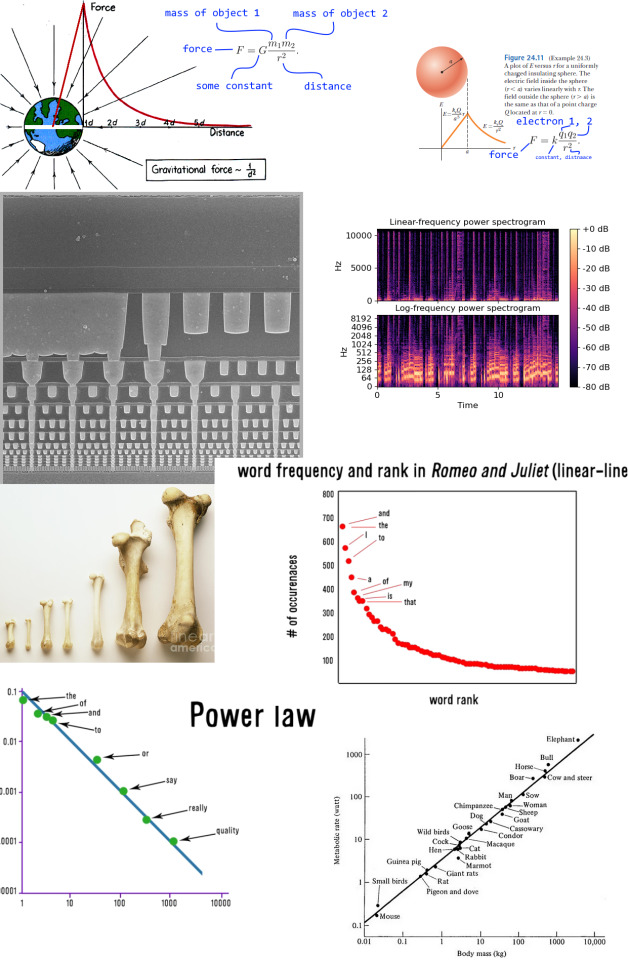
showing how simple laws physics determine the "spacing", "size", or "frequency". pay attention to the graph's x and y axis spacing. 1) notice how properties of planets and electrons are following the exact same pattern. 2) on the audio spectrogram on the right; the top graph is incomprehensible because it's linear, if we just change the scaling to logarithmic, your eyes will function like your ears and you will be able to spot details. 3) notice how the CPU wirings (the gray image) exponentially grow due to electrical resistance laws 4) same with animal size vs bone thickness 5) zip's law on word usage frequency in a given language.
this logarithmic nature of the universe is repeating, it's fractal, no matter whether you look inward or outward, the fractal pattern doesn't care about which point in the scale you are. it's following the same behavior. these are entirely separate branches of physics, one of them is planetary and the other is quantum, they operate with different scales and are totally irrelevant in relation to each other in terms of their effect on one another. yet guess what, they're following the same behavior, even though they're weaving their waves on different invisible fabrics of the universe, but the universe is fractal so i guess it doesn't matter.
despite how the entirety of your sensory inputs work logarithmically (non-linearly), because of standard education, people think that the universe operates linearly, one of their mistakes is in the difference between the audio and brightness controls in Linux vs windows. on windows they behave how you expect them to behave, but on Linux, the controls are non-logarithmic (linear) making the use of them very frustrating, most of the brightness slider is just low brightness and then it suddenly exploding in brightness (or volume in the case of an audio slider) in the last portion of it, making it feel imbalanced only because the slider was linear.

the concept of phase criticality is the middle point when complex systems change from one state to the other. like when you pressure water so much and give it enough heat at the same time it becomes both liquid and gas at the same time. there is a theory that the same behavior emerges in complex systems like the brain. the neurons there also follow the same pattern, they can be too "hot"; firing chaotically all the time, people call it a seizure. or too cold; being in a coma. the optimal state is the critical phase state where your brain is at right now as you're reading this post.
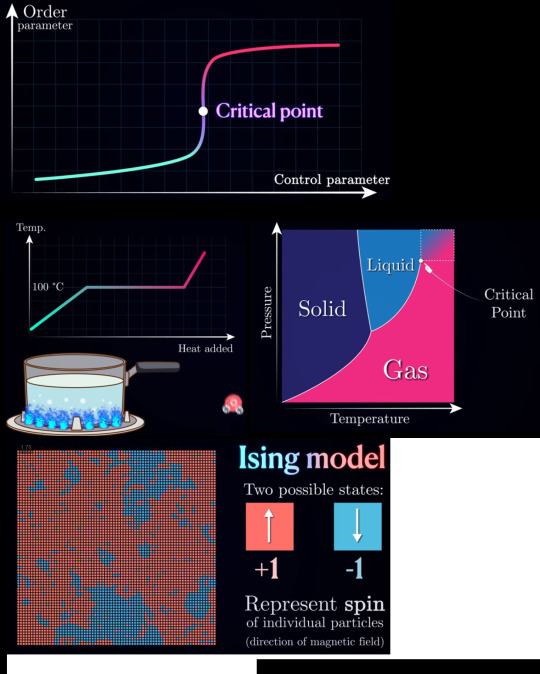
and "obviously" in the video, you can see that the state in the middle (critical phase) is fractal. which is consistent for a complex system such as the brain.
that's just another way concepts and patterns are constantly repeating in the universe across different things.. and honestly saying that the universe is fractal or logarithmic becomes meaningless. because you can obviously see that everywhere, it's easy to do so, it's just that people don't use their brain.
and i think it doesn't matter at this point, since that's the default in the universe, but maybe people are obsessed with it because it gives them a sense of value, like they're not stupid or blind and can see. to me right now it feels like they're saying "liquid water can take any shape!" ok. so?
i suggest you watch this video. it's really a roller coaster of ideas and this shit is like brain candy- well, candy for the brain. :3
youtube
the 80-20 rule says 80 of things are responsible for 20 percent of things or vice versa. like… 80% of profit can come from 20% of customers. or that 80% of our misery would go away if only we solved 20% of the problems, or that you can learn 20% of a subject to be able to achieve 80% of things. or that 80% of blog interactions come from 20% of reblogs or followers.
so what? what the fuck are you looking for? why are we treating 80-20 as if it's some golden ratio shit, oh don't even get me started on the golden rashitio where people randomly fit a standard spiral png on random images on call it "wow the universe is so beautiful" bro stfu the thing doesn't even fit the image. so what about the million other beautiful things that don't follow that "rule"?
this is confirmation bias. what about all the other ratios? what about all the numbers you aren't looking for, are 80% of your words are made by 20% of your keys on the keyboard? it's really easy to actually just google "letters frequency in english" and run a calculator for 10 seconds (it's a 50-20 ratio). boohoo, the results didn't fit this silly cognitive bias.
and actually wake up. 80% isn't good enough, it's not good enough at all. are you really okay with a fleet of airplanes whose survival rate is 80%? is it okay if your heart surgeon read only 20% of the books he should've read? is it okay if your CPU did 80% of its operation correctly, the whole fucking modern world would fall apart. most things in life are not crucial, but so many things require perfection, fuck the 20% effort 80% results thing, fuck that, it's not the most we can achieve, give me a 900% effort 99% results lifestyle. give me perfection, give me awe, inspire me, give me beauty. i don't want to live in a world filled with inventions that are 80% of what could've been achieved, i want to live in a world filled with fewer things that are a testament to human perfection.
the same applies to my love. i don't want an 80% love, i want perfection, i want it to hurt, i want to suffer because of it, i wanna love for real. i wanna pay for that true love. i wanna remember more. i wanna put more effort, more effort, more more more MORE MORE MORE FUCKING EFFORT. i don't wanna be comfortable i don't wanna be comfortable, i don't need to be comfortable, i don't want comfort, i want something real. i wanna love fully, i wanna deserve that love, i want something so beautiful, and i don't wanna give up so easily, i don't wanna forget beautiful memories due to me succumbing to the fucking universe and physics and power laws and logarithmic tendencies. i want to put my maximum effort. i feel like i'm not doing enough, i am not enough. i can always do more, i can achieve more, i ought to do more, why the fuck put a limit to myself? i can do it. i can perfect my time management and i can achieve what i want i can learn how to balance things in my life.
i can love beautifully.
i'm not a machine, my body is. my soul isn't i'm not a slave to it. my body will die, my soul won't. my soul is insane, illogical and i say fuck you to the universe. even after i die, i give you a big fat middle finger because my soul will rebel against this place.
i don't want least resistance love. i don't accept forgetting even though i will forget a lot. my soul refuses to let go of all the moments we've had together. sometimes i try to cheat by recording everything. but i want to live in the moment, i want to find the balance.
i don't accept being a slave to some shitty power law. i might just be delusional, and i might forget anyway. but i know that i did not accept this and i know that i did put effort and it wasn't the shortest path.
sometimes i'm scared of getting used to things.
but i take nothing for granted, things are always moving and are always changing, i don't want things to be fake or stale. i want everything that is real, even if it's sad. i want my existence to be truthful.
written by: debonairrose.tumblr.com
as a gift to @lusi-1 (i hope you like my brain vomit darlingo)
#writings#text#my thoughts#shower thoughts#biology#entropy#thermodynamics#physics#neural networks#life#love#effort#recovery#crazy guy#spilled thoughts#spilled ink#writing#fractal#nature#math#Youtube
15 notes
·
View notes
Text
youtube
Oh, hey! An old college friend had a video go viral in the fakemon/poketuber sphere this week.
I know I don't exactly have a huge following or anything, but y'all should check her out if pokemon fanart is your stomping ground. Be nice though!! No drama in the comments --She's already kinda anxious about the sudden extra attention as is.
But she's always been super talented, and has struggled with navigating the socialmedia engagement b.s. that's so unfairly become a necessary second job/skill set for so many artists. So, I'm excited for her that she's finally cracked the algorithm and gotten some well deserved attention, at least with this one video. She's totally overdue for some recognition for all the work she puts in!
(I was gonna link her tumblr too but I don't think she's used that thing in ages..)
10 notes
·
View notes
Text
Solarpunk and the Internet Or: How to Unfuck the Internet?
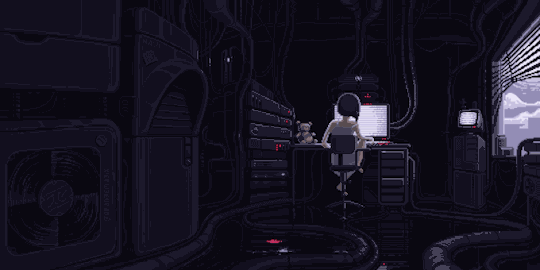
Okay, I just gotta talk about this. Because it is actually quite a headache.
How do we unfuck the internet?
Because let's face it, right now the internet is a fucking shitshow for so many different reasons. For the most part because it is so centralized on just a few platforms - and those are very much controlled by advertizers and in many cases also some algorithms that are basically a blackbox for the users.
I first got access to the internet in 1999, though I only started using it for real in 2001, because only in 2001 I got access to somewhat higher speed internet. (The kind where you could at least show a jpg without waiting 10 minutes for it to load). Hence: I do remember the time when everyone was mostly communicating through forums, while a lot of people had their own pages and where there were tons of different fansites out there to a variety of topics.
And sure, there are still some fansites out there, but a lot of that these days is actually channeled through all sorts of Wikis, rather than classical fansites. While a lot of the other stuff is somewhat centralized.
And don't get me wrong. Technically speaking that centralization is not a bad thing. It allows you to see a lot more fanworks, for example, than otherwise. And as a creative it allows you in turn to get more eyes on your stuff. But we do have to reckon with both the thing about algorithms and the fact how much it controls what we can post.
Basically there are right now not many platforms on which you can post explicit fanwork, or generally anything explicit in forms of creation.
And outside of the creative sphere there is always a good chance that a lot of information can be suppressed on those centralized platforms. We have seen the stuff of people posting about Palestine being banned from a variety of platforms for all sorts of vague reasons.
Sure, a lot would probably be unfucked, when the platforms would be handed to the people. That is rather than being controlled by some CEOs and boards of directors be controlled by the community itself.
But there is also the two-sided issue of the centralization. Because on one hand it is good. Because information can travel a lot further and a lot faster with it. Still, it also does bring a variety of issues with it, that are... less easy to solve.
For example the quick proliferation of information can also lead to a lot of misinformation spreading. Something that has definitely been increased through social media being a thing.
And exactly that is the point that gives me a headache.
The internet is amazing. Especially from a solarpunk point of view. You can share information online for free. You can also use it to help with organizing of stuff. You can connect with people all over the world so easily.
But there are also some inherent dangers - and I am not sure that we have the ability to tackle them right now.
#solarpunk#lunarpunk#internet#internet culture#social media#social networks#misinformation#fandom culture#creativity#anti capitalism#fuck capitalism
23 notes
·
View notes
Text
Over the past few years I've eased off on trying to be an "appealing blog" and have let myself be weird and boring. I feel less vulnerable but more of a full person. It's nice.
I'm kind of touched people still engage with me / seem to like my posts even though I'm dequeuing random stuff that feels important and real to me but isn't interesting.
The part of me that wants to play popularity / follower-count-go-up games is getting exercised on twitter. I expect to get bored of this – my follower count is lower on twitter, but the negative interaction rate is higher due to the algorithm showing my content to randos faster than I can block them. My lust for attention will almost certainly be slaked before I hit 10K. After that, maybe I'll find another outlet.
My relationship with internet attention is different. I used to treat the internet as my diary because I wanted understanding, and because I had a deep and right feeling that my thoughts are public property. Now, at least on tumblr, the second factor is dominant. (I disclose much less than when I was younger because my irl and internet social spheres merged and intense disclosure embarrasses me, and because my most vibrant thoughts are increasingly about other people's private thoughts. It is nice to not be lonely, but what a cost.)
I notice I've barely linked my porn of the past 4 months anywhere, including in my actual porn server on Discord*. I just don't think those works are very good. I would love to get a flood of reviews and kudos, but the lack of it doesn't bother me. I am content to put the works out there and get 500 hits.
*By the way, if you have zero triggers, want an invite to my erotica writing and reccing Discord, and are okay being declined after a brief vetting conversation, DM me.
The me of five or ten years ago – who craved attention for her creativity – would be shocked by this attitude. But I'm now comfortable with the long game – if what I write is really good, eventually lots of people will be reading everything I write, the way I read everything by an author who passes a certain bar of competence / kink compatibility. If I'm good enough, it'll happen. If I'm not, it won't. Seems fine.
I'm happy to feel this way and not the way I used to feel. And I'm happy to be boring on here, and make meandering posts like this.
57 notes
·
View notes
Text
It no longer makes sense to speak of free speech in traditional terms. The internet has so transformed the nature of the speaker that the definition of speech itself has changed.
The new speech is governed by the allocation of virality. People cannot simply speak for themselves, for there is always a mysterious algorithm in the room that has independently set the volume of the speaker’s voice. If one is to be heard, one must speak in part to one’s human audience, in part to the algorithm. It is as if the US Constitution had required citizens to speak through actors or lawyers who answered to the Dutch East India Company, or some other large remote entity. What power should these intermediaries have? When the very logic of speech must shift in order for people to be heard, is that still free speech? This was not a problem foreseen in the law.
The time may be right for a legal and policy reset. US lawmakers on both sides of the aisle are questioning Section 230, the liability shield that enshrined the ad-driven internet. The self-reinforcing ramifications of a mere 26 words—“no provider or user of an interactive computer service shall be treated as the publisher or speaker of any information provided by another information content provider”—has produced a social media ecosystem that is widely held to have had deleterious effects on both democracy and mental health.
Abraham Lincoln is credited with the famous quip about how you cannot fool all the people all the time. Perhaps you cannot, but perhaps the internet can. Imperfect speech has always existed, but the means and scale of amplification have not. The old situation cannot be the guide for the new.
Section 230 was created during a period when policy was being designed to unleash internet innovation, thereby maintaining America’s competitive edge in cyberspace. The early internet was supported by a variety of friendly policies, not just Section 230. For instance, sales arranged over the internet were often not taxed in early years. Furthermore, the internet was knowingly inaugurated in an incomplete state, lacking personal accounts, authentication mechanisms, commercial transaction standards, and many other needed elements. The thinking was not only that it was easier to get a minimal design started when computing power was still nascent, but also that the missing elements would be addressed by entrepreneurs. In effect, we were giving trillion-dollar gifts to parties unknown who would be the inevitable network-effect winners.
Section 230 was enacted as part of the 1996 Communications Decency Act, a larger legislative effort within the umbrella 1996 Telecommunications Act. Section 230(c)(1) provides immunity for online services regarding user-generated content, ensuring the companies hosting content are not treated as publishers of this information. Section 230(c)(2) offers Good Samaritan protection from civil liability when the companies—or platforms, as we call them today—in good faith remove or moderate objectionable content.
After President Bill Clinton signed the 1996 Telecommunications Act into law, it was unclear how the courts might interpret it. When the dust cleared, Section 230 emerged as something of a double-edged sword. It could be used to justify censorship, and at the same time be deployed as a corporate liability shield. Most importantly, it provided the runway for the takeoff of Google, Twitter, and Facebook. (And now TikTok—which, being a Chinese company, proves that Section 230 no longer serves American interests.)
The impact on the public sphere has been, to say the least, substantial. In removing so much liability, Section 230 forced a certain sort of business plan into prominence, one based not on uniquely available information from a given service, but on the paid arbitration of access and influence. Thus, we ended up with the deceptively named “advertising” business model—and a whole society thrust into a 24/7 competition for attention. A polarized social media ecosystem. Recommender algorithms that mediate content and optimize for engagement. We have learned that humans are most engaged, at least from an algorithm’s point of view, by rapid-fire emotions related to fight-or-flight responses and other high-stakes interactions. In enabling the privatization of the public square, Section 230 has inadvertently rendered impossible deliberation between citizens who are supposed to be equal before the law. Perverse incentives promote cranky speech, which effectively suppresses thoughtful speech.
And then there is the economic imbalance. Internet platforms that rely on Section 230 tend to harvest personal data for their business goals without appropriate compensation. Even when data ought to be protected or prohibited by copyright or some other method, Section 230 often effectively places the onus on the violated party through the requirement of takedown notices. That switch in the order of events related to liability is comparable to the difference between opt-in and opt-out in privacy. It might seem like a technicality, but it is actually a massive difference that produces substantial harms. For example, workers in information-related industries such as local news have seen stark declines in economic success and prestige. Section 230 makes a world of data dignity functionally impossible.
To date, content moderation has too often been beholden to the quest for attention and engagement, regularly disregarding the stated corporate terms of service. Rules are often bent to maximize engagement through inflammation, which can mean doing harm to personal and societal well-being. The excuse is that this is not censorship, but is it really not? Arbitrary rules, doxing practices, and cancel culture have led to something hard to distinguish from censorship for the sober and well-meaning. At the same time, the amplification of incendiary free speech for bad actors encourages mob rule. All of this takes place under Section 230’s liability shield, which effectively gives tech companies carte blanche for a short-sighted version of self-serving behavior. Disdain for these companies—which found a way to be more than carriers, and yet not publishers—is the only thing everyone in America seems to agree on now.
Trading a known for an unknown is always terrifying, especially for those with the most to lose. Since at least some of Section 230’s network effects were anticipated at its inception, it should have had a sunset clause. It did not. Rather than focusing exclusively on the disruption that axing 26 words would spawn, it is useful to consider potential positive effects. When we imagine a post-230 world, we discover something surprising: a world of hope and renewal worth inhabiting.
In one sense, it’s already happening. Certain companies are taking steps on their own, right now, toward a post-230 future. YouTube, for instance, is diligently building alternative income streams to advertising, and top creators are getting more options for earning. Together, these voluntary moves suggest a different, more publisher-like self-concept. YouTube is ready for the post-230 era, it would seem. (On the other hand, a company like X, which leans hard into 230, has been destroying its value with astonishing velocity.) Plus, there have always been exceptions to Section 230. For instance, if someone enters private information, there are laws to protect it in some cases. That means dating websites, say, have the option of charging fees instead of relying on a 230-style business model. The existence of these exceptions suggests that more examples would appear in a post-230 world.
Let’s return to speech. One difference between speech before and after the internet was that the scale of the internet “weaponized” some instances of speech that would not have been as significant before. An individual yelling threats at someone in passing, for instance, is quite different from a million people yelling threats. This type of amplified, stochastic harassment has become a constant feature of our times—chilling speech—and it is possible that in a post-230 world, platforms would be compelled to prevent it. It is sometimes imagined that there are only two choices: a world of viral harassment or a world of top-down smothering of speech. But there is a third option: a world of speech in which viral harassment is tamped down but ideas are not. Defining this middle option will require some time to sort out, but it is doable without 230, just as it is possible to define the limits of viral financial transactions to make Ponzi schemes illegal.
With this accomplished, content moderation for companies would be a vastly simpler proposition. Companies need only uphold the First Amendment, and the courts would finally develop the precedents and tests to help them do that, rather than the onus of moderation being entirely on companies alone. The United States has more than 200 years of First Amendment jurisprudence that establishes categories of less protected speech—obscenity, defamation, incitement, fighting words—to build upon, and Section 230 has effectively impeded its development for online expression. The perverse result has been the elevation of algorithms over constitutional law, effectively ceding judicial power.
When the jurisprudential dust has cleared, the United States would be exporting the democracy-promoting First Amendment to other countries rather than Section 230’s authoritarian-friendly liability shield and the sewer of least-common-denominator content that holds human attention but does not bring out the best in us. In a functional democracy, after all, the virtual public square should belong to everyone, so it is important that its conversations are those in which all voices can be heard. This can only happen with dignity for all, not in a brawl.
Section 230 perpetuates an illusion that today’s social media companies are common carriers like the phone companies that preceded them, but they are not. Unlike Ma Bell, they curate the content they transmit to users. We need a robust public conversation about what we, the people, want this space to look like, and what practices and guardrails are likely to strengthen the ties that bind us in common purpose as a democracy. Virality might come to be understood as an enemy of reason and human values. We can have culture and conversations without a mad race for total attention.
While Section 230 might have been considered more a target for reform rather than repeal prior to the advent of generative AI, it can no longer be so. Social media could be a business success even if its content was nonsense. AI cannot.
There have been suggestions that AI needs Section 230 because large language models train on data and will be better if that data is freely usable with no liabilities or encumbrances. This notion is incorrect. People want more from AI than entertainment. It is widely considered an important tool for productivity and scientific progress. An AI model is only as good as the data it is trained on; indeed, general data improves specialist results. The best AI will come out of a society that prioritizes quality communication. By quality communication, we do not mean deepfakes. We mean open and honest dialog that fosters understanding rather than vitriol, collaboration rather than polarization, and the pursuit of knowledge and human excellence rather than a race to the bottom of the brain stem.
The attention-grooming model fostered by Section 230 leads to stupendous quantities of poor-quality data. While an AI model can tolerate a significant amount of poor-quality data, there is a limit. It is unrealistic to imagine a society mediated by mostly terrible communication where that same society enjoys unmolested, high-quality AI. A society must seek quality as a whole, as a shared cultural value, in order to maximize the benefits of AI. Now is the best time for the tech business to mature and develop business models based on quality.
All of this might sound daunting, but we’ve been here before. When the US government said the American public owned the airwaves so that television broadcasting could be regulated, it put in place regulations that supported the common good. The internet affects everyone, so we must devise measures to ensure that our digital-age public discourse is of high quality and includes everyone. In the television era, the fairness doctrine laid that groundwork. A similar lens needs to be developed for the internet age.
Without Section 230, recommender algorithms and the virality they spark would be less likely to distort speech. It is sadly ironic that the very statute that delivered unfathomable success is today serving the interests of our enemies by compromising America’s superpower: our multinational, immigrant-powered constitutional democracy. The time has come to unleash the power of the First Amendment to promote human free speech by giving Section 230 the respectful burial it deserves.
23 notes
·
View notes
Note
Hey! Just a heads up, I'm sending this to multiple people, since I wanna get as many different viewpoints on this as I can. I hope this doesn't bother you. Also, this is pretty long.
So, I have a question about gamedev, but more on the marketing/presence side.
Most gamedevs I know, even hobbyist ones, keep their accounts relatively professional. Sure, they may shitpost here and there, but it's mostly in relation to their games, the gamedev sphere in general, or very general inoffensive stuff. And, most importantly, I've seldom seen my favorite gamedevs (or any of my favorite internet personalities, for that matter) comment on random videos unrelated to what type of content they usually post.
All of my social media accounts are quite unprofessional. I've also had them for a long time, so there are a few things on my digital footprint that I'd rather people not see. I also, for lack of a better way of explaining, watch and read random shit and like to leave comments on it sometimes.
I feel like, I were to become a gamedev, I wouldn't be able to do that anymore. I'd have to treat my internet presence as its own balancing act, rather than a place for me to express myself unabashedly. I know this is working under the assumption that I would get big and that people would give a damn about me, but there is always the off chance of that happening. Of a random game you make suddenly blowing up because it hit the algorithm just right. So it's better to be prepared. And even if I don't get that big boom in popularity, I still plan to at least make games consistently enough to build a community of their own. Nothing like, huge, but I really enjoy the idea of people enjoying my work and sharing that enjoyment with others. But I don't want that to cross over into my personal life!
I know that's not an impossible feat, but I feel like it kind of destroys the purpose of the internet for me. To me, it's always been a safe space where I could express myself and easily connect with people with similar viewpoints, but I am now coming to odds with this concept as I consider how I want to become a gamedev.
There's also the side note that I don't wanna rebrand. At least not completely. I don't mind cleaning up my accounts or deleting some old ones, but I've grown very attached to being "Quamai". I can't imagine myself having any other online identity, even if there are some cringy moments attached to it.
So, do you have any advice for my situation? How did you personally go about your own online image, and what do you think is the best course of action?
Thank you in advance!
Oh, I am such a funny person to come to about this- I never let being a game dev stop me from interacting with works I like, haha! Maybe that’s just because I’m a smaller creator, though. Just recently I posted death note fan art, I’m currently working up the courage to post about fandom related ocs, and I’m hosting a game jam encouraging fan works that might be considered “cringy.”
The people who like you and your work will still be there regardless. You can count on that as a fact! So why should you stop yourself from having fun?
Life is far too short to be worried about your public image to such a high degree. Like you said, these are already things that you actively do to express yourself and enjoy! So if it gives you any semblance of comfort, I’ll start doing even more “unprofessional” things to help you out there <3 /pos
#ask#I’m not saying like. to do crazy horrible things though online LOL#obviously I just mean that harmless fun is harmless and you shouldn’t feel embarrassed by it!#if you look at any of your favorite creators they probably have fan art up somewhere#embrace what makes you happy! be self indulgent! it’ll attract like-minded people and overall make you happier <3#ironically I think this was the push I needed to start posting non game related art so thank you!!!
14 notes
·
View notes
Note
This is gonna sound more like a statement but it's really a question of validity. I have a thought and i would some feedback/criticism. I feel like I talk too definitively sometimes lol
I feel like too many people are rooting their feminism in anger rather than concrete politics. This is mostly about online radfem circles but it happens in liberal circles as well.
It's a bit hard to explain why I hate this approach because I don't take issue with women being angry and I think more people should be angry about oppression and misogyny.
The problem with anger is that it's malleable. In my opinion, this is a major contributor to the terf pipeline or the "left to right" pipeline. It's very easy to point to a fault to direct your anger at, and terfs/ right-wing people use that to their benefit.
One of the reasons I always found misandry so off-putting is because of reactive it is. Don't get me wrong I fucking hate men and I don't care about women hating men. I just dont like the idea that misandry is intrinsically linked to feminism. There is nothing feminist about hating men. You can do it, it's a free country but there will never be anything progressive about writing off an entire group of people over one singular ill defined trait.
I hate when women say misandry is ok because men kill and rape women. Or when they claim it's misogynistic to hate misandry. And that's what I mean when I say politics rooted in anger than concrete ideas.
That misandry will be manipulated against marginalized men far more than it will be against the average cishet white etc etc.
I get so annoyed when I see women try to use feminism to defend blatant bigotry (sometimes actual misogyny too) and justify it by saying men are so evil or there are bigger threats to feminism or whatever.
I sent an ask a while back about the "left wing pipeline" and why it functionally can't exist. That sort of links to my point here. When you base your understanding of feminism on violence and anger, you become very resistant to any other aspect of leftism and leftist politics (race, class, etc). Especially when these ideas position women as oppressors rather than oppressed. The "algorithm" picks up on that anger and pulls you towards equally unproductive feminist ideas that only validate your anger without ever challenging your other ideas.
I've always said a radicalizing technique used by terfs is anger. By spreading all kinds of stories and issues that affect females only they're able to evoke that anger and frustration. They're very intentional on the stories they share. For example, focusing on like Indian and Arab misogyny- things like honour killings and FGM- to simultaneously anger you against men but also promote racist representations of MOC.
Once these new wave radfems turned terfs are in that enraged state any attempts at introducing intersectionality is seen as a threat or distraction. It happened back during October 7th. So many "feminist" turned on Palestinians because Hamas was supposed raping and abusing women (from what I remember that was propaganda but I cannot confidently say). So busy being angry at men that you would rather advocate for a genocide than just think for a minute.
Like I'm glad women are angry and women aware of the extent to which male violence can go but if you just focus on being angry with no rational you're just waiting to dragged to the right. I'm not saying we should defend rapist men because they're minorities but at least be aware of propaganda and over representation.
I think a lot people operate under the assumption that the right hates women and are ok with violence against them but that's not the case. They only hate when it happens in the public sphere. That distinction is what makes a lot of feminist fall very quickly for right wing propaganda and side with oppressive policy.
I don't know. Correct if I'm wrong or if I'm just letting my anger direct me. It just all gets so annoying after awhile. I'm tired of having to defend men.
I think a lot of what you’re saying is reasonable and valid.
I think anger can be politically useful (Audre Lorde wrote a great essay on this), but only when it it oriented towards motivating action and change. If it’s something you just sit with, and use to craft your persona/mediate all your interactions, then I think that’s where it can be detrimental. And yes, it can be weaponized by bad actors to lead you down the wrong path as well. That’s why a solid political foundation is needed, like you said.
As for misandry, I guess it depends on what you mean by that. If by misandry you mean, not caring about men’s opinions and not seeking out relationships with men, then I actually do think it is feminist. But if by misandry you mean, using slurs towards men of color or promoting the rape of men/boys, then I would say no, that’s not feminist, that’s just another form of bigotry.
3 notes
·
View notes
Note
Hey! Just a heads up, I'm sending this to multiple people, since I wanna get as many different viewpoints on this as I can. I hope this doesn't bother you. Also, this is pretty long.
So, I have a question about gamedev, but more on the marketing/presence side.
Most gamedevs I know, even hobbyist ones, keep their accounts relatively professional. Sure, they may shitpost here and there, but it's mostly in relation to their games, the gamedev sphere in general, or very general inoffensive stuff. And, most importantly, I've seldom seen my favorite gamedevs (or any of my favorite internet personalities, for that matter) comment on random videos unrelated to what type of content they usually post.
All of my social media accounts are quite unprofessional. I've also had them for a long time, so there are a few things on my digital footprint that I'd rather people not see. I also, for lack of a better way of explaining, watch and read random shit and like to leave comments on it sometimes.
I feel like, I were to become a gamedev, I wouldn't be able to do that anymore. I'd have to treat my internet presence as its own balancing act, rather than a place for me to express myself unabashedly. I know this is working under the assumption that I would get big and that people would give a damn about me, but there is always the off chance of that happening. Of a random game you make suddenly blowing up because it hit the algorithm just right. So it's better to be prepared. And even if I don't get that big boom in popularity, I still plan to at least make games consistently enough to build a community of their own. Nothing like, huge, but I really enjoy the idea of people enjoying my work and sharing that enjoyment with others. But I don't want that to cross over into my personal life!
I know that's not an impossible feat, but I feel like it kind of destroys the purpose of the internet for me. To me, it's always been a safe space where I could express myself and easily connect with people with similar viewpoints, but I am now coming to odds with this concept as I consider how I want to become a gamedev.
There's also the side note that I don't wanna rebrand. At least not completely. I don't mind cleaning up my accounts or deleting some old ones, but I've grown very attached to being "Quamai". I can't imagine myself having any other online identity, even if there are some cringy moments attached to it.
So, do you have any advice for my situation? How did you personally go about your own online image, and what do you think is the best course of action?
Thank you in advance!
oh gosh what a question ldkjfadl
hmmmm
putting this under a cut because it got long and rambly lakdfa
for me personally i don't think i've ever made that many "right" choices when it comes to how i handle my online presence in game dev, it was mostly just me doing what seemed like the right thing to do at the time. it's also changed a lot all throughout my time as a dev
tho i guess the main thing is that i did create a whole new game dev online identity, so to speak, when i first got into game dev. this wasn't really due to any purposeful thought put into it though and was more just because 1) i didn't really have much online identity anyway at the time and 2) in the beginning i was trying to be more "professional" LOL
when i released easter, i did it without any presence at all. i had no accounts or anything. i literally just finished the game and threw it up on itch and gamejolt using the new studio name i had come up with based on an inside work joke. it wasn't until i started to get a few people talking about the game or linking to it/making vids that i was like hmmm i should have a twitter maybe LOL so like a week later i made a twitter. but i barely posted on it, it was just responding to other people. a year later when i released the 2.0 update i also made a few posts. then thought i might start using it more so started posting just a few random updates of new stuff i was trying out/working on (this was when i made my first couple of posts about early OW stuff)
but then when i shifted out of game dev again for a while, i abandoned it
it wasn't until august of 2021 that i began actively using my account again to post production updates for work on ow. but back then i was a lot more "emotionless" for lack of a better word. like i approached it in a more no-nonsense way than i do today. i also never got that much response from it either, usually lucky to get like 2 or 3 likes on stuff 🤣 over the course of that first year or so though i would change a lot in how i handled my online stuff, acting much more like myself, interacting a lot more with people, and getting increasingly more unhinged(???) LOL perhaps because i'd begun to see that being "super professional" when i'm just a little random person making a game all by myself there's no reason to be so stiff (and it's just much more fun and genuine to not be afraid to be myself and be a bit silly). over this time was also when i'd shift away from using my studio name and just taking the "carrot" identity. because i realized i didn't like people thinking about me as an impersonal studio and wanted to just be me, carrot, interacting with people, making games, and getting unhinged about my chars and stories
is this the right way to do it???? i have no idea. but perhaps since i never have any aspirations of grandeur and don't plan to be any kind of business, it's fine for me. and while it's true that i don't like to post, reblog, interact with, content unrelated to my games or other VN stuff, that's mostly because i don't want to annoy people who i know only follow me for game stuff (i worry about annoying people a lot, actually, it might be one of the core foundations for how i handle myself online LMAO). i don't have any other presence online though. once i started my game dev stuff, carrot became me, and it's all that's out there. so it's not like i need to "separate" anything. but also i'm not a very avid user of social media in general so it's not like i have an active desire to have different accounts so i can tweet about or comment on other stuff lakdjfasd i'm an old socially anxious duck who gets mentally exhausted just scrolling my feed. i don't need to spend any more time online than i already do with my game dev stuff hahaha. i do know some other devs though for instance that have private accounts on twitter just for their friends and more personal thoughts. so that's always an option too
as for what you should do in your own situation with your own online presence, i'm not really sure, as it all comes down to what you want. for me, since i didn't have much presence anyway, and because i wanted my game dev stuff to be its own thing, it made sense for me to create a new presence just for game dev (that eventually evolved into my entire self LKDJFAS). so it's hard for me to say what would be the best course of action if you already have an online presence that forms a core part of your identity that you don't want to lose. it also depends on what you want to eventually do with your games and if you see yourself really wanting to pursue it actively and make it a big part of your life. most devs that i know do have "game dev" presences for lack of a better word, where if you go to their accounts, it's just for game dev. or they create studios and studio accounts. i think no matter what you decide to do, even if you keep the name the same, it would probably be best to at least keep your game dev stuff separate, because people could potentially be put off from following an account for games but then their feed gets filled with a lot of non-game stuff from you that they don't care about
no matter what you decide to do though, i recommend being yourself no matter what. whether you keep with your same identity or craft a new game dev only one, still do what feels right for you on that account and be yourself and have fun with it!! game dev can already be such an isolating and hard experience, so creating a space where you can be silly and have fun with other devs and fun with your chars and ideas can really help so much to give you motivation and just enjoy your time creating games!!!
(sorry if this was a complete ramble that didn't even still fully answer the question; i can only speak from my own personal experiences that i went through after all and i don't really have any good or professional answers since i also have no idea what i'm doing most of the time 🤣)
8 notes
·
View notes
Text
Prologue
(The Hastag for these is #HKR-BTS)
youtube
So I’ve been thinking about how I’m gonna start doing a Behind The Scenes for Hollow Knight Resurrected And, while I’ve put a ton of theming in the series. I think there’s one theme that really permeates the whole thing. This theme kinda came about by accident… but it’s the least surprising thing in the world that it’s all over these videos, because it’s how the videos came to be at all: Never let anyone tell you that rage and spite cannot create something beautiful. Especially if the thing you’re raging against is “The Way Things Are.” People will try to tell you it is dishonorable to fight against the dark to reach the end of the tunnel. Fight them too. They put the tunnel there. And that light at the end doesn’t just exist in front of you, it’s above you, and if the walls and ceiling of the tunnel cease to exist, that light would shine on you, and all the people you love, where you stand.
But of course the thing I was spiting at the time was the Youtube Algorithm, so if that up there resonated with you, sorry about that kick in the balls lol.
Anyway that’s no secret. That’s how I announced I was gonna be making Hollow Knight videos again! But it ultimately starts with the idea I had for Whenever Silksong came out was a more narrative focused series than my Hollow Knight one, and maybe a little longer running because the only content youtube would recommend to anyone from our channel was the Hollow Knight videos despite the overall praise that they got. They just didn’t get as many immediate views.
But I had an idea of the character I wanted hornet to be. That’s why she’s the best characterized bug early on. And if I ever do end up doing that Silksong series, not a lot of that will have changed. My original idea for Hornet is still very much who she is currently in HKR, I’ve just delved a little deeper. I liked to play a wide swath of games. I’ve never liked to stick to one for very long, and if I was gonna stick to one, it was probably going to be something like Path of Exile. But Hollow Knight is a game that’s good as hell. But I kind of resented youtube for Pigeonholing me into being a Hollow Knight Youtuber. But, it was getting to the point where the channel was just slowly wasting. And, well, Silksong did not come out. And the things that gave us the big views were the Hollow Knight videos. This was on top of me having a pretty bad year. A couple of my family members got very sick from cancer, My dad had mostly decided to remove himself from my life, and I’d gotten into a car crash. So, Fuck it. New Hollow Knight series.
Now having my friends do voice acting was kind of a new idea. And ultimately, just a really good one. I’d had them do some quotes on some of my video essays. But voice acting characters was something I’d just started having them do. The first one was the video directly preceding the Hollow Knight ones. A Dyson Sphere Simulator video about building a giant penis! It was a lot of fun and taking that route into Hollowest was ultimately the best possible way to go! The original idea was to make it a prologue to what the Silksong videos were going to be. Just kind of a short jaunt through Hollownest where I spent one episode per area. And then after every video, put a little advertisement for my other videos to maybe get people to watch those, and then maybe youtube would start recommending them, and then I become un-pigeonholed.
And to be clear. The thing I said in the announcement video where I pointed out it was not the fault of anyone who watched my videos that they didn’t get big. Still true. Youtube Fucked me. Not my fans. I’ve been incredibly lucky on youtube honestly! The very worst comments I’ve gotten have been along the lines of “Broo you’re still doing Hollow Knight stuff? Booring” And contrasting with the best comments that have been close to “this series changed my life” The community I’ve grown and the fans I’ve gotten have always surprised me as being fantastically supportive and wonderful. I might have the most positive comments section in all of youtube! But that means there’s no controversy, so there’s no hatewatching. Youtube would much prefer some toxicity. The only sin the Graveyard Media fans have committed is being way to chill.
But if you’re wondering why I haven’t stopped, even though it didn’t work to stop the channels decline, it’s the same reason that it didn’t become a simple one episode per zone series. Because the more I did, the more I fell in love with what I was making. And the more I wanted to nurture it and make it into something I was proud of. If it was gonna be the youtube channels Last Hurrah, I wanted to make is such a hurrah that it will be worthy of remembrance! (Can’t even keep myself from the LOTR bullshit in this lmao)
And I’m proud of what I’ve done on it. And all the best stuff is still to come. I’ve saved most of it for the final episode. And I’m gonna try and get that done too! Because if I can keep going after all I’ve been through, god will need to come down from heaven with a gun and shoot me in the head if he wants me to stop!
13 notes
·
View notes
Note
i am close to writing communities like the ones you describe in your post and i think to some extent they are ashamed. that or they lost any kind of touch with the feeling of shame and artistic curiosity, which is worse ig
but it just baffles me because they don't even make money like at all, like i would get it if they got bank from debasing something i for a fact know was a passion for a ton of money, but it's just for like ??? goodreads stars?? twitter engagement??? some of them don't even break 100 bucks a year for constant trend chasing and algorithm gaming
idk i also left that sphere years ago to become a hobbyist and it's heartening to see im not alone at least. felt insane for a while
we feel exactly the same way lol. i wonder how many of those people were around for livejournal/"the old internet" where it was normal to make things for fun and not profit or if they're all from the hustle economy/passive income scam seminars that tell idiots that art makes money
21 notes
·
View notes
Text
Is There Something Flux Cannot Do?
Yes. A fucking lot.
Even with the improved dictionary that correctly parses a lot of stuff and a data model that finally can draw someone holding a weapon mostly correctly (70% of the time, it works every time!), forcing anything resembling an art style out of Flux is a pain in the ass.
It boggles the mind why the fuck that ornery bastard software has so much difficulty imitating stuff that's been in the public domain long before it was established. I tried the major names, Leonardo, Rembrant, Vermeer, Delacroix, and got shit. The best I could get was some vaguely 19th century pap and hyper-realistic 1950s poster work, and that's mostly thanks to the face-swapping workflow that I'm using. Who the fuck would be bothered about training the data model the basics of art history, digital reproductions of which are either under CC or Public Domain licenses? While still, fucking still replicating people's digital signatures on stuff rendered in generic digital painting style that might have been drawn by anyone and everyone?


It still doesn't do vampires. That portrait of a woman with moon in the background was supposed to depict a vampire. The SD1.5 face swapper failed miserably, of course, I know, but neither Flux nor SDXL could draw vampires with fangs correctly, either.
It wipes the fuck out on all attempts of drawing remotely furry stuff. Ask for a realistic animal, you'll get it. Ask for a cartoon animal, you'll get it. Ask for a fantasy painting of a chinchilla barbarian in a crown... Oh Jesus fucking Christ, you have to see that abomination yourself to believe it, and that's the absolute fucking best I could squeeze out of that algorithm.
On the left, you have a DALL-E 3 rendering that I used for one of my song covers. That is very much a chinchilla. Dressed as a barbarian. Triumphant. Holding a sword. And it even has a fluffy tail.
On the right, you have Flux. A very apt name, because it looks like an explosion of runny shit. It's dysentery, it's bloody diarrhea, it looks like a lot of things, maybe a mouse, maybe a Tasmanian Devil, maybe your neighbor too. It can hold a sword, sure. But even considering that machines don't have fantasy, whimsy or imagination, DALL-E 3 is still able to put together something that looks as ridiculous as an average user wants: that guy's a beefcake, but he's also fluffy. Flux drew something overly aggressive, mangy and overweight.

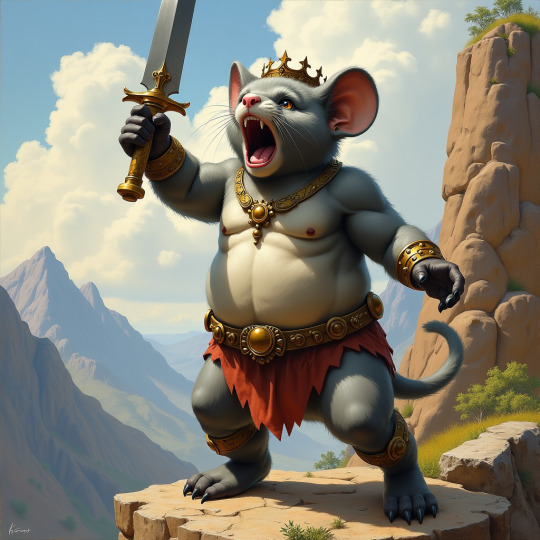
It can't do NSFW. The publicly available online implementations already block NSFW words in the prompt and throw an unbelievable shit-fit every time, just as expected, but if you try doing some horny art on your home install... I can't post an image, but I will describe it to the best of my ability. If you're lucky, you're gonna get weird pasties in place of nipples. If not... you'll get clown noses. I mean, fuck. I have no idea what they did to that algorithm, but imagine your nipples being replaced by weird, shiny, squishy red spheres looking like cherry tomatoes or rubber balls. I wish I was fucking joking.
It can't do celebrities. It knows an approximation of Marilyn Monroe and that's it. It can't do Keira Knightley, it can't do Jenna Ortega, it can't do Timothee Chalamet, it can't do Tom Holland, it can't even do that posturing old bitch John Wayne. Imagine this: you get the first version of an algorithm that can draw hands and feet correctly more often than all the previous ones combined without being blackboxed on some corporate server farm, and to draw the likeness of any celebrity, even a long-dead one, you have to fall back on the rickety old tech that is now a laughingstock even among the laymen, because that one at least knows how Elvis looks.
Plus, those are two results of asking Flux for a fat old Elvis. It literally can't draw a fat Elvis with sunglasses on. Remove the sunglasses from the prompt and bang: banana and bacon sandwich overload.
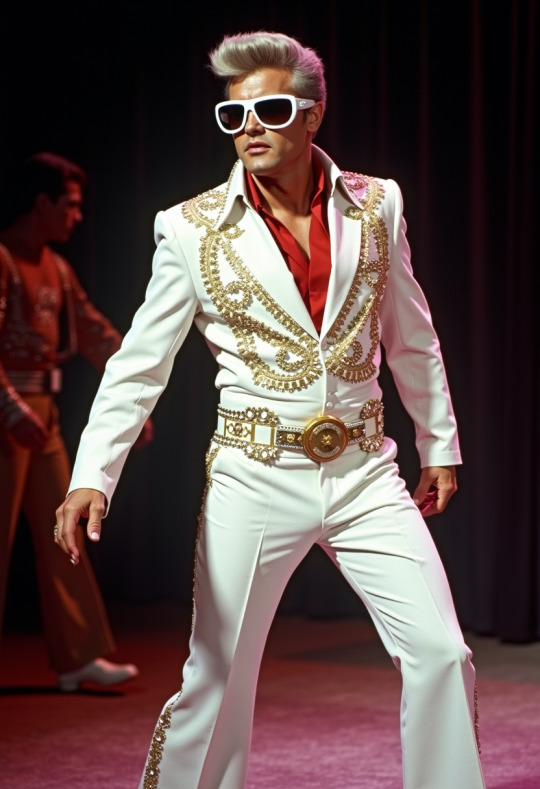

It doesn't do body jewelry, and to a degree even larger than the previous versions of Stable Diffusion. At least those could do several earrings at once, and Flux either doesn't do that at all, or I don't know the magic word. "Multiple earrings" doesn't work, and I got it on one picture where I haven't even asked.
I also caught it doing some weird Midjourney kind of bullshit. Like, ask it for a Pepsi can, and you'll get a Pepsi can looking like it was freshly fetched from Google Images. But to get a parody or at least a pastiche of a Pepsi can, you can't say "Pepsi". The prompt to get the design on the right is:
photo of dark blue drink can with round wavy red and blue logo above the word "benzi"
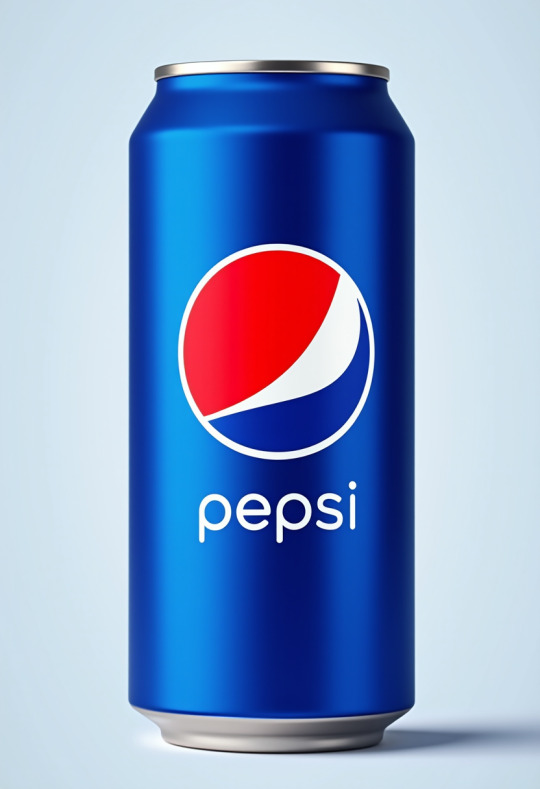
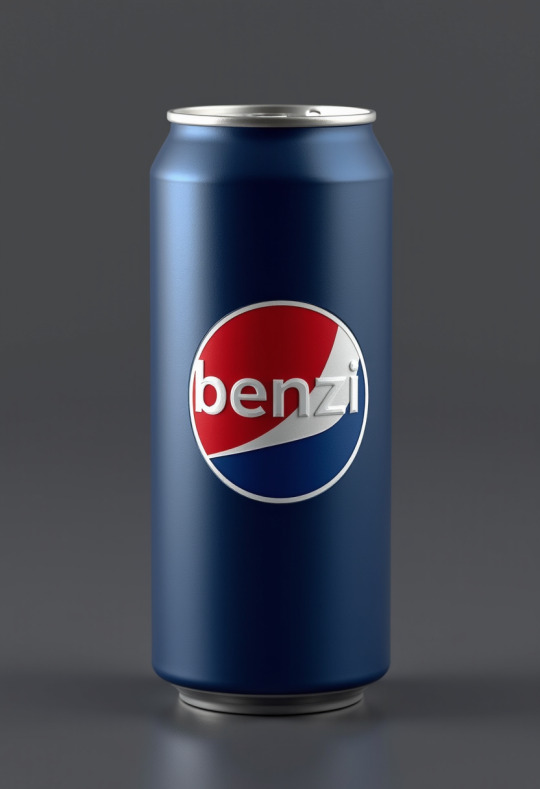
If you're familiar with the "Bepis" meme, you know what to do with the name. If not, it's still a good name for a drink if you're marketing it in Europe: "Benzi-Cola: the fuel for you!" But still, with the pointers of the logo being round, wavy, red and blue, sometimes it tries to avoid violating the trademark, while other times it... doesn't. The legal department is going to have a lot of fun with this one, again.
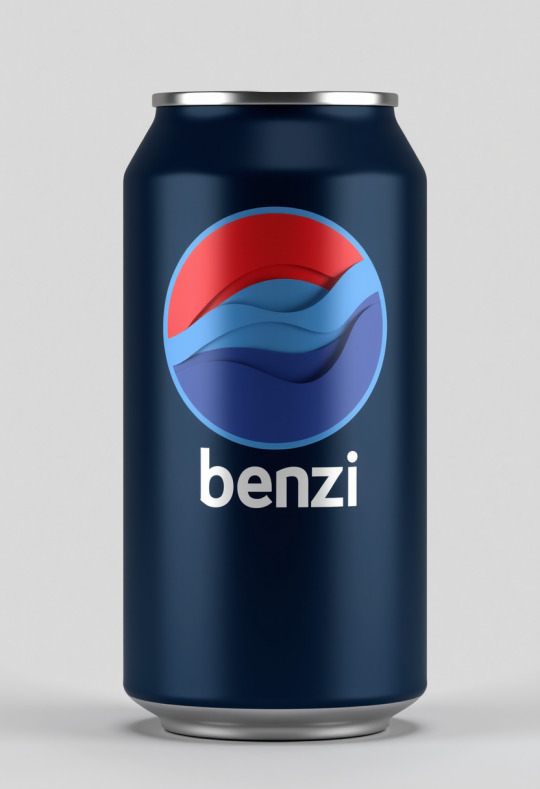
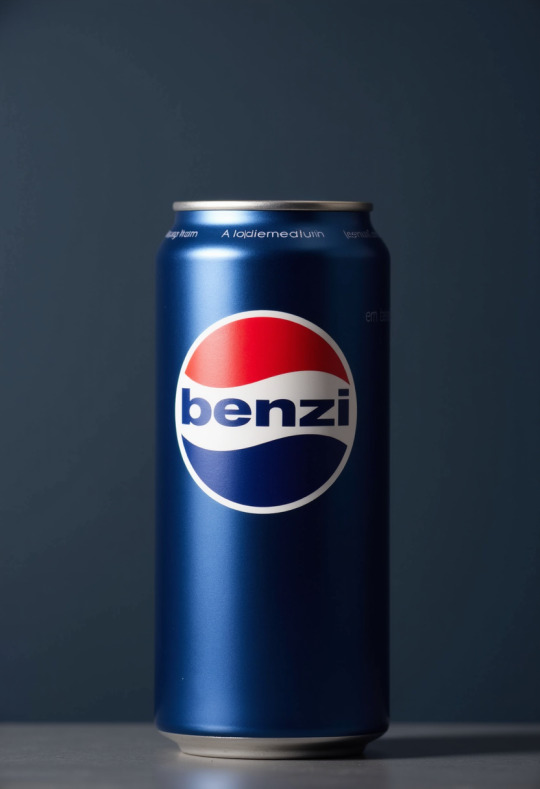
Also, like I said, that data model is MASSIVE. The first version was about 24 gigabytes in total, they first slashed it down to 16 gigabytes so it runs on higher-end video cards without problems (if you don't try rendering four images at the same time, because then it's gonna go tits-up anyway), and now they're aiming for 8 GB, unfortunately, not compatible with cards that have 8 GB because they're too old already.
#AI image generation#Stable Diffusion#Flux#Flux Dev#Mike's Musings#technology#artificial intelligence#ai technology
2 notes
·
View notes
Text
Dear Sephiroth: (a letter to a fictional character, because why not) #112
Yesterday's letter was flagged as spam on Facebook, and taken down.
Facebook is a place on the internet where people post up their various thoughts, writings, images, and whatnot so that others can see it. It's another means of screaming into the void and hoping that kindness will return to you. I generally write my letters on a place called Tumblr, and then scooch a slightly modified version of it over to Facebook, since the formatting for these places is slightly different. The goal is to make it so that my words are more likely to reach you and more likely to reach others who need them.
…I'm not really sure how it happened. Supposedly the box of maple-flavored tea that I showed you yesterday was offensive, though I'm not sure how. What's worse is that I'm not sure if it was the algorithm or what. It's complicated to explain. I'm not going to bother you with the details.
Either way, suppose I'll be posting only in this place until that gets all figured out. Suppose what I'll do on Facebook is post up that my next letter is out and give anyone the link who asks me for it.
I did some more work today, listing and describing items. I also did some dishes. I also finally got around to putting the third layer of epoxy on the amethyst tree sphere. Hopefully by the time it's cured, the inconsistencies in its shape will be mostly gone and it'll be ready to be sanded. The set of extremely fine-grit sandpaper arrived today, and I'm eager to put it to good use. I hope it turns out well. Suppose we'll see what happens.
Today it's warm enough outside to leave all the windows of the house open, so we opened all the windows. The breeze flowing in smells like grass and fresh soil; it's a good smell. I wish you were here to enjoy it.
At some point, I took a walk. Some of the plants around where I live are starting to sprout leaves again. I know that you like pictures of nature, so I took a few pictures for you; maybe you'll like them:






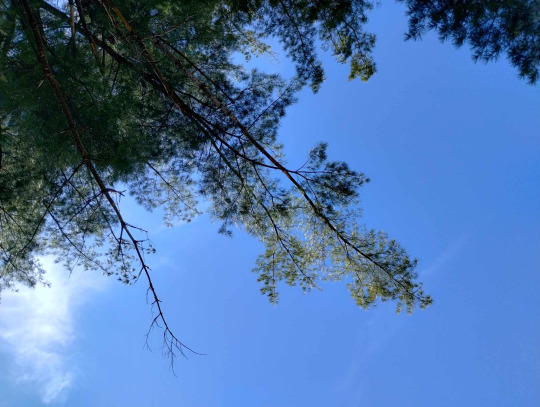

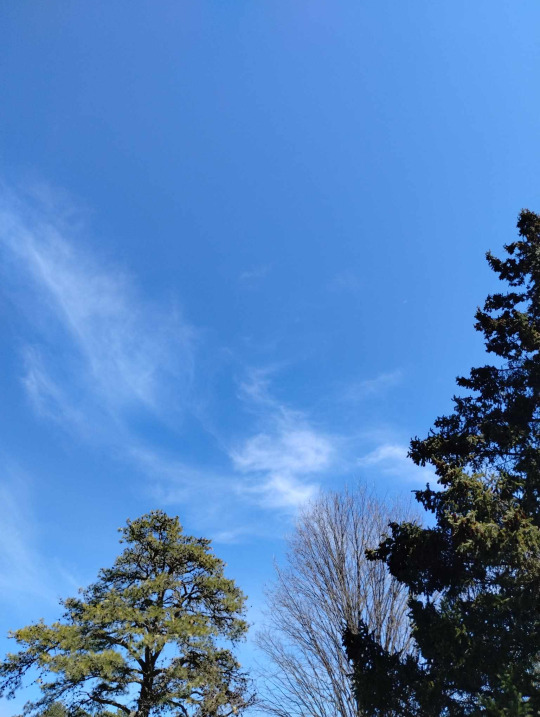
I also found a feather on the ground later in the day:

...Maybe I'll imagine that it means you'll be safe somehow.
…I feel kind of lost and empty today for reasons I don't fully understand. I think maybe I just need more water and food. I haven't been eating or hydrating well for the last several days. I drank a rehydration solution today (Pedialyte), but I've only eaten minimally; not much of an appetite. I haven't been sleeping well, either, for various reasons. Suppose if I wanna feel better, I'm gonna hafta do a better job of the whole self-care thing for at least the next week or so. Bleh.
Are you taking care of yourself? Are you safe and warm? Do you have plenty of food to eat and things to drink? Soft plushies to hug? I know you can't answer me, but I'll ask anyway. I'll ask because you deserve to have people check in on you. I'll ask because I wish you could answer. Nobody here knows, of course. And I suppose the uncertainty of it all is very difficult to deal with. But I'll keep doing my best. I'll keep my eyes and ears open for any news.
Br is visiting, and that feels good. Upon realizing that I've not eaten much today, she cut some fruit for us to share. I have a bowl of Asian pear slices and chunks of dragonfruit. I wonder if you've ever had these. I wonder if you'd like them:

We were going to watch Junk Man, but folks were hungry, and so we went to the grocery store to get a pizza. Br can't have gluten, so we got this pizza that was made with tapioca flour. And we also got toppings to add to it, since it was just a cheese pizza. We put on roasted garlic, portobello mushrooms, and pepperoni (we checked the ingredients to make sure there was no gluten, don't worry)! I was delighted to find out that the crust tastes and feels like Brazilian cheese bread! And if you don't know what that is, it's basically this bread thing that is wonderfully chewy and cheesy and amazing. The pizza was absolutely delectable!!
…It probably doesn't surprise you to know that I feel a lot better since eating. Bodies and minds get weird when the blood sugar gets low. I'll have to try to be more mindful of making sure I eat even when I don't have much of an appetite, I guess.
Br had to leave by 9 though, so there wasn't enough time for a movie. But we watched Steven Universe instead! J and I have already seen it through several times, but Br still hasn't seen most of it. Today we got to the part where we meet Lapis Lazuli.
…I think maybe you might relate to her, at least a little. She was enslaved in a mirror and used as a tool for years before Steven set her free. She was understandably very angry at the other gems for knowingly keeping her trapped in the mirror. She responded by attacking them, and then stealing the ocean, but then Steven talked to her and fixed it. It's a long and complicated story, but it's wholesome.
…I wish you could come here and watch Steven Universe with us, because actually, I think there's a lot in it that you would be able to relate to. I wish you could watch it with us and eat the yummy pizza with us. I wish you could see the whole thing. And I wish I could give you all kinds of tasty snacks to enjoy while we watch it. Alas… alas…
Well. I'm maybe rambling a little. So I suppose I'll end today's letter here. Don't forget that there are people out here wishing well on you, okay?
I love you. I'll write again in a little while. Please stay safe.
Your friend, Lumine
#sephiroth#ThankYouFFVIIDevs#ThankYouFF7Devs#ThankYouSephiroth#final fantasy vii#final fantasy 7#ff7#ffvii#final fantasy vii crisis core#final fantasy 7 crisis core#final fantasy crisis core#ffvii crisis core#ff7 crisis core#crisis core#ff7r#final fantasy vii remake#final fantasy 7 remake#ffvii remake#ff7 remake#final fantasy vii rebirth#final fantasy 7 rebirth#ffvii rebirth#ff7 rebirth#final fantasy 7 ever crisis#ffvii ever crisis#ff7 ever crisis#ffvii first soldier#facebook algorithm woes#bad brain days#wholesome
5 notes
·
View notes